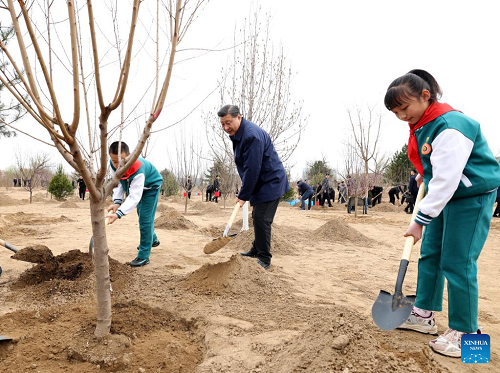 From April 19 to April 22 the European Consortium for Political research is welcoming – at the University of Edinburgh and online – over 400 scholars to its annual Joint sessions of workshops. Our Fellow Virginie Arantes is taking part in the workshop “Marketing Authoritarian Practices at Home and Abroad”, with a paper entitled “When environmental and authoritarian discourses collide: marketing green nationalism in China”.
From April 19 to April 22 the European Consortium for Political research is welcoming – at the University of Edinburgh and online – over 400 scholars to its annual Joint sessions of workshops. Our Fellow Virginie Arantes is taking part in the workshop “Marketing Authoritarian Practices at Home and Abroad”, with a paper entitled “When environmental and authoritarian discourses collide: marketing green nationalism in China”.
Abstract

Chinese President Xi Jinping plants a tree in Daxing District, Beijing, March 30, 2022 (Xinhua/Huang Jingwen).
In the battle for global legitimacy, the Chinese Communist Party (CCP) has learned to take advantage of the public consensus regarding the need to be more environmentally sustainable. The “ecological civilisation” rhetoric—which integrates environmental protection in the nation’s authoritarian political system—has become a key political slogan nationally and abroad. This state-led “sinicised” version of environmentalism frees the regime from the trajectory of Western societies and function as a charm offensive to the failures of slow-paced and plural decision-making processes under liberal-democracies. This paper takes green nationalism as its main theoretical focus to contribute to theory-building by conceptualising green nationalism in China’s authoritarian context. Building on ethnographic observations in Shanghai, a Metropole aspiring to put China at the top of the list of the world’s most sustainable cities, and qualitative analysis of Chinese leaders’ discourses, it proposes a more nuanced and contextual understanding of how China’s authoritarian regime mine environmental discourses to enhance its legitimacy at national and international levels. Drawing on constructivist political theory that views nationalism as an everyday performance, the paper introduces novel ways to understand the implications of the instrumentalization of the environmental sphere by China’s authoritarian regime. A close study of discourses and actions will (1) provide stronger clues into formulations of green nationalism and (2) highlight the different ways in which the internationally ascribed obligations and norms of climate change are appropriated, calibrated, and legitimated to forge national identity, national interests and claims to legitimacy in authoritarian settings.
Virginie Arantes will also speak at the conference “Future Practices of Citizenship in Asia and the West. The Care of the Self III”, organised from April 25 to April 29 by the International Institute for Asian Studies. She will present a paper on “‘Green’ Citizenship and the Depoliticization of Environmental Governance in Urban China”.
Virginie, PhD in Social and Political Sciences (ULB), was granted a postdoctoral fellowship to carry out a research project entitled “Effective ‘Collaborative’ Governance: A Comparative Look at Environmental NGOs roles in China and Taiwan”, under the supervision of Prof. Anna Lora-Wainwright (Oxford School of Global and Area Studies).


